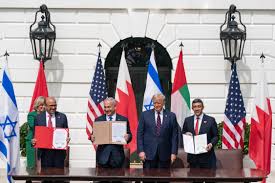Understanding the Abraham Accords: Impact and Importance

Introduction
The Abraham Accords, signed in September 2020, represent a historic agreement aimed at normalizing relations between Israel and several Arab states, including the United Arab Emirates (UAE) and Bahrain. This agreement is significant as it marks a departure from the long-standing Arab-Israeli conflict and opens the door for diplomatic and economic cooperation in the region. The importance of the Accord goes beyond mere politics; it has the potential to reshape geopolitical dynamics, encourage peace, and foster economic collaboration across the Middle East.
Key Details of the Abraham Accords
The Accords were brokered under the administration of then-U.S. President Donald Trump, demonstrating a commitment to find common ground among nations traditionally at odds with one another. Besides the UAE and Bahrain, Morocco and Sudan also joined later, further expanding the coalition of Arab nations recognizing Israel. The agreements focus on several key areas, including:
- Normalization of Diplomatic Relations: Countries involved in the Accords pledged to establish embassies, enhance trade, and foster mutual respect.
- Security Cooperation: The agreements aim to address security concerns in the region, particularly regarding Iran’s influence.
- Economic Opportunities: The accords open avenues for trade, investment, and technology partnerships, potentially leading to improved prosperity for all nations involved.
Current Developments
Since the signing, there have been various developments indicative of progress and challenges. High-profile visits between leaders and ongoing dialogues have taken place, fostering a sense of cooperation. However, obstacles remain, particularly regarding the Palestinians, who view the normalization as a betrayal of their cause. The Biden administration has expressed its support for the Accords, aiming to build upon this foundation to further peace initiatives.
Conclusion
The Abraham Accords signify a pivotal moment in Middle Eastern diplomacy, with the potential for lasting change in both political and economic spheres. As more nations consider joining the Accords, the prospects for regional stability and cooperation become increasingly promising. It highlights a shift towards diplomacy over conflict in a region long fraught with tension. While challenges persist, the initiative sets a crucial precedent for future discussions aimed at achieving a more peaceful coexistence in the Middle East.









